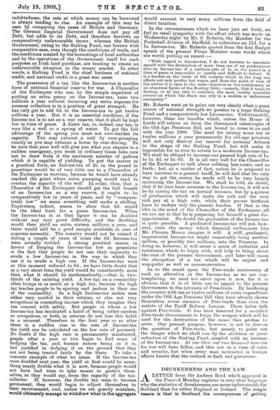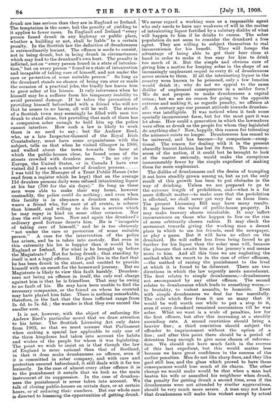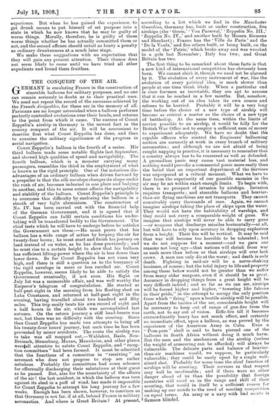DRUNKENNESS AND THE LAW.
ALETTER from Sir Andrew Reed which appeared in the Times of Monday explains in very clear lauguage why the statistics of drunkenness are more unfavourable for Scotland than for either England or Ireland. The simple reason is that in Scotland the consequences of getting drunk are less serious than they are in England or Ireland. The temptation is the same, but the penalty of yielding to it applies to fewer cases. In England and Ireland "every person found drunk in any highway or public place, whether a building or not, shall be liable" to a certain penalty. In the Scottish law the definition of drunkenness is extraordinarily lenient. The offence is made to consist, not in being drunk, but in being drunk in circumstances which may lead to the drunkard's own hurt. The penalty is inflicted, not on "every person found in a state of intoxica- tion," but on every person "found in a state of intoxication and incapable of taking care of himself, and not under the care or protection of some suitable person." So long as the drunkard stands no chance of being run over or made the occasion of a practical joke, the kindly law leaves him to grow sober at his leisure. It only intervenes when he himself may be a sufferer from his temporary inability to avoid personal damage. If he takes the precaution of providing himself beforehand with a friend who will see that he comes to no harm, all will be well. The streets of a Scottish town may seemingly be filled with men too drunk to stand alone, but providing that each of them has a companion sober enough to hold him up the police cannot interfere. How such a law is likely to work there is no need to say ; but Sir Andrew Reed, who, as a late Inspector-General of the Royal Irish Constabulary, must have some acquaintance with the subject, tells us that when he visited Glasgow in 1906, and walked about the town towards the hour at which the public-houses close, he found some of the streets crowded with drunken men. "In no city in Europe, the United States, or in Canada I have ever visited did I see such a number of drunken persons I was told by the Manager of a Trust Public House (who read from a register which he kept) that on the average 116 drunken persons daily were refused intoxicating liquor at his bar (700 for the six days)." So long as these men were able to make their way home, however unsteadily, the police could do nothing ; and even when this faculty is in abeyance a drunken man seldom wants a friend who, for once at all events, is soberer than himself, and willing to do him a service which he may repay in kind on some other occasion. Nor does the evil stop here. Now and again the drunkard's ordinary good fortune deserts him. He is "incapable of taking care of himself," and he is too obviously "not under the care or protection of some suitable person." A case for the intervention of the police has arisen, and he is taken into custody. But even in this extremity his lot is happier than it would be in England or Ireland. For what is he brought up before the Magistrate ? Not for being drunk ; that standing by itself is not a legal offence. His guilt lies in the fact that he has been drunk in the street, and omitted to provide himself with an escort for the homeward journey. But no Magistrate is likely to view this fault harshly. Drunken- ness not being an offence in itself, the only real charge against him is that he is friendless. That may be owing to no fault of his. He may have been unable to find the necessary companion, or the friend on whom he counted may have played him false. There is nothing remarkable, therefore, in the fact that the fines inflicted range from 2s. 6d. to 7s. 6d. ; the wonder is that they ever exceed the smaller sum.
It is not, however, with the object of enforcing Sir Andrew Reed's particular moral that we draw attention to his letter. The Scottish Licensing Act only dates from 1903, so that we must assume that Parliament when making a special law applicable to only one of the three kingdoms had taken into account the habits and wishes of the people for whom it was legislating. The point we wish to insist on is that though the law of England is more rational than that of Scotland, in that it does make drunkenness an offence, even if it is committed in sober company, and with care and protection assured beforehand, it still deals with it far too leniently. In the case of almost every other offence it is to the punishment it entails that we look as the main instrument of its suppression. In the case of drunken- ness the punishment is never taken into account. We talk of closing public-houses on certain days, or at certain hours, or of reducing theft: numbers. But our whole care is directed to lessening the opportunities of getting drunk. We never regard a working man as a responsible agent who only needs to have any weakness of will in the matter of intoxicating liquor fortified by a salutary dislike of what will happen to him if he drinks to excess. The sober population do not seem to consider the drunkard a free agent. They are willing to subject themselves to real inconvenience for his benefit. They will forego the advantage of being able to get their beer close at hand in order to make it less easy for him to drink too much of it. But the simple and obvious cure of giving him a motive for keeping sober in the shape of an increasingly unpleasant sequel to every fit of drunkenness never occurs to them. If all the intoxicating liquor in the country were known to be poisoned, only a few lunatics would drink it ; why do not we appeal to the same dislike of unpleasant consequences in a milder form ? We do not propose to make drunkenness a capital crime ; but we see no reason for going to the opposite extreme and making it, as regards penalty, no offence at all. A century ago our present attitude towards drunken- ness was intelligible. It was noticed when it took some specially inconvenient form, but for the most part it was let alone. How could a generation in which the lawmakers were often as drunk as the people for whom they legislated do anything else ? Now, happily, this reason for tolerating the nuisance exists no longer. Drunkenness has ceased to be universal, and has become—by comparison—excep- tional. The reason for dealing with it in the present absurdly lenient fashion has lost its force. The common- sense of the nation, if it could but be brought to look at the matter seriously, would make the exceptions immeasurably fewer by the simple expedient of making them far more unpleasant.
The dislike of drunkenness and the desire of trampling it out have steadily grown among us, but as yet the only result of this growth has been to put obstacles in the way of drinking. Unless we are prepared to go to the extreme length of prohibition, and—what is a far more difficult matter—to make sure that the prohibition is effectual, we shall never get very far on these lines. The present Licensing Bill may have many results. It may lessen the value of public-house property. It may make brewery shares unsaleable. It may inflict inconvenience on those who happen to live on the rim of some arbitrarily chosen radius. It may check the movement towards giving the working man a decent place in which to see his friends, read the newspaper, or play a game. But it will have no effect on the drunkard. He will suffer less from being forced to go further for his liquor than the sober man will, because the pleasure that awaits him at his journey's end means more to him. And all this time we are neglecting the method which we resort to in the case of other offences, —the method of raising the punishment to the level at which it is found to be deterrent. There are two directions in which the law urgently needs amendment. The first relates to simple drunkenness,—drunkenness not accompanied by any other offence. The second relates to drunkenness which leads to something worse,— to brutality, to violent assaults, to homicide. Even with simple drunkenness we deal far too mercifully. The evils which flow from it are so many that it would be well worth our while to put a stop to it, even if every drunkard remained unconscious till he was sober. What we want is a scale of penalties, low for the first offence, but after this increasing at a steadily ascending rate. A second conviction should bring a heavier fine ; a third conviction should subject the offender to imprisonment without the option of a fine ; and after this point there should be a period of detention long enough to give some chance of reforma- tion. We should not have much faith in the success of this last expedient, but this would matter less because we have groat confidence in the success of the earlier penalties. Men do not like sharp fines, and they like gaol still less, and the glass which proved to have these consequences would lose much of its charm. The other change we would make would be that when a man had beaten his wife or assaulted his neighbour when drunk, the penalty for getting drunk a second time, even if the drunkenness were not attended by similar aggravations, should be very much more severe. A man may not know that drunkenness will make him violent except by actual experience. But when lie has gained the experience, to get drunk means to put himself of set purpose into a state in which he now knows that he may be guilty of worse things. Morally, therefore, he is guilty of these worse things whether he has actually committed them or not, and the second offence should entail as heavy a penalty as ordinary drunkenness at a much later stage. We make these suggestions with no expectation that they will gain any present attention. Their chance does not seem likely to come until we have tried all other expedients and found them fruitless.








































 Previous page
Previous page